How To Prevent Fires In Your Grow Room
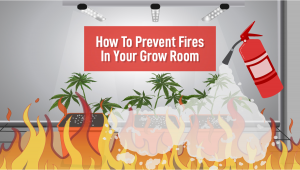
- 1. Preventing fires in your grow room
- 1. a. Ground fault circuit interrupter
- 1. b. Smoke detectors
- 2. Stopping fires in your grow room
- 2. a. Extinguisher balls
- 2. b. Aerosol extinguishers
- 2. c. Handheld extinguishers
- 3. What to do during a fire
- 4. Top tips to keep your grow room safe
- 5. In conclusion
It may sound made up but i’s not uncommon to hear about an accidental fire due to a grower’s negligence. Obviously, not all fires are caused by careless growers, in some cases, they can be caused by faulty equipment but it doesn’t matter if it’s the grower’s fault or faulty equipment, these fire-related accidents can have grave consequences such as burning down your house or apartment building, so here’s what you need to know in order to prevent fires in your grow tent. No need to say that we hope you never have to deal with fire but, just to be safe, make sure to read the following tips and stay 100% safe when growing feminized seeds!
When talking about lighting up, we’re referring to joints, blunts, and bongs—not your house! Naturally, growing rooms pose a potential fire hazard. They have confined spaces with a reduced airflow, lots of electrical equipment, and lots of water (especially when growing hydroponically). One accidental spill is enough to land you in a very bad situation. Plus, a lack of knowledge of electrical equipment can lead growers to overload circuits. Adding to this, poor ventilation caused by a lack of fans and an extractor can lead to things drastically overheating. Overall, when growing weed indoors, you need to keep in mind appropriate equipment, proper ventilation, optimal temperature and humidity, and appropriate lighting in order to avoid a potentially devastating situation.
1. Preventing Fires In Your Grow Room
The main cause of fires is electrical-related problems so the first tip is to not overload the electrical circuits. Most growers don’t have much electrical knowledge and there’s really no need to know a lot, but it’s highly recommended you know at least the basics.
Electrical Safety
All growing equipment needs electricity to work so the most important fire prevention measure is identifying:
- Circuit amperage;
- Circuit capacity and;
- Power consumption.
As you may know, every plugin your house is connected to a circuit, and this circuit can only handle a certain amount of electricity so, in order to be safe, you need to know exactly how much that circuit can handle. In most cases, the breakers (inside the power box) will indicate the amperage and based on the amperage you can know the maximum amount of electricity the plugs in your grow room can handle.
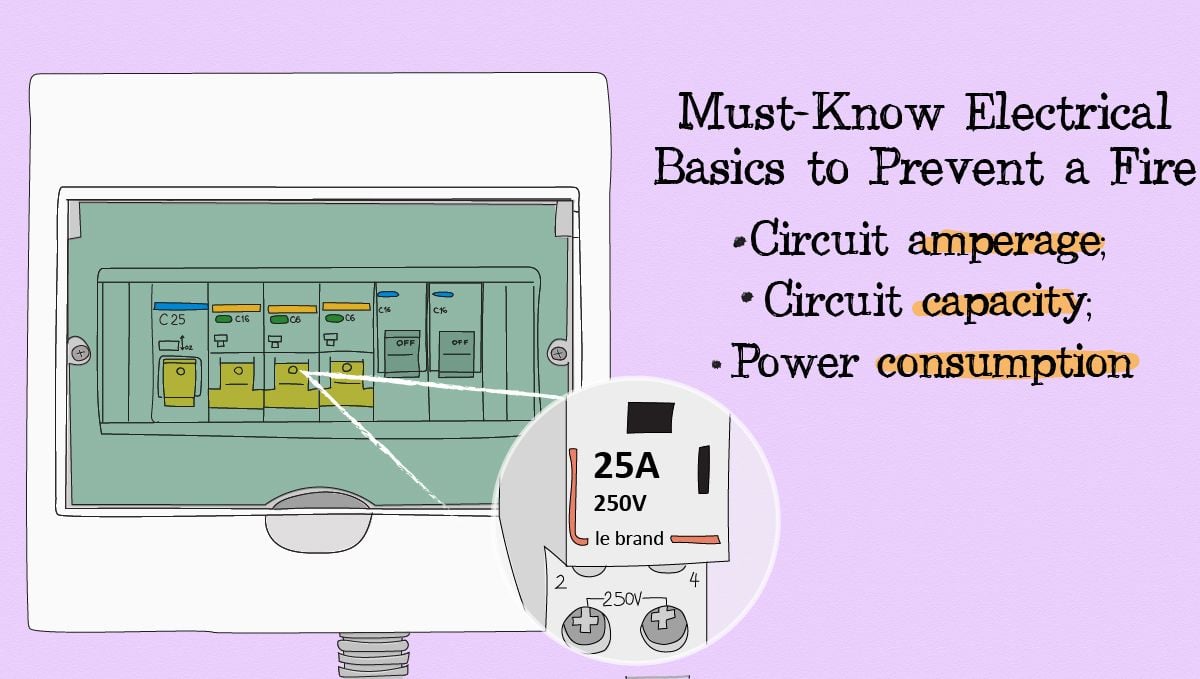
So first of all, go to the power box, look for the breaker corresponding to the grow room and write down the amperage; The amperage is described as a number followed by the letter A, so you may find a 15A, 20A, or 30A breaker, this number indicates the amperage. For those of you who don’t want to do the math, here’s a table that’ll make your life easier:
| Circuit's Max. and Recommended Wattage | ||||||
|---|---|---|---|---|---|---|
| Voltage | 110V | 220V | ||||
| Amperage | 15A | 20A | 30A | 15A | 20A | 30A |
| Max. Wattage | 1650W | 2200W | 3300W | 3300W | 4400W | 6600W |
| Recommended | 1320W | 1760W | 2640W | 2640W | 3520W | 5280W |
The recommended wattage is lower than the max. wattage because it's recommended to use a maximum of 80% of the circuit's capacity for equipment that runs for more than 8hs per day. Now, if you want to learn how to calculate this, read along, it’s very simple. It’s just a matter of identifying the amperage and voltage. So if you have 110V outlets labeled as 20A, it means that the circuit in that room can handle a maximum of 2200 watts; You can calculate it with the following formula:
Outlet Voltage x Amperage = Max Wattage
110 V x 20 A = 2200 W
It doesn’t really matter what the amperage and voltage are, you will always be able to find the maximum wattage by following the formula above, just note that the maximum wattage is what the whole circuit can handle (the whole room), not just one power outlet. Also, remember that it’s highly recommended to use 80% of the circuit’s maximum voltage when leaving equipment running for more than 8 hours.
Once you know what your circuit can handle, it’s just a matter of checking the label on your equipment and seeing the actual power consumption. Based on these amounts you’ll be able to know if your circuit can handle it or not. Have in mind that most circuits will be able to handle one grow tent easily (with the equipment, obviously), but if you are planning on having more than that it’s highly recommended you make sure your circuit can handle it.
Ground Fault Circuit Interrupter
If you want to add a layer of protection, you may want to look into Ground Fault Circuit Interrupter strip or outlet, these can sense current leakages (like it would happen in a fire) and automatically shut down.
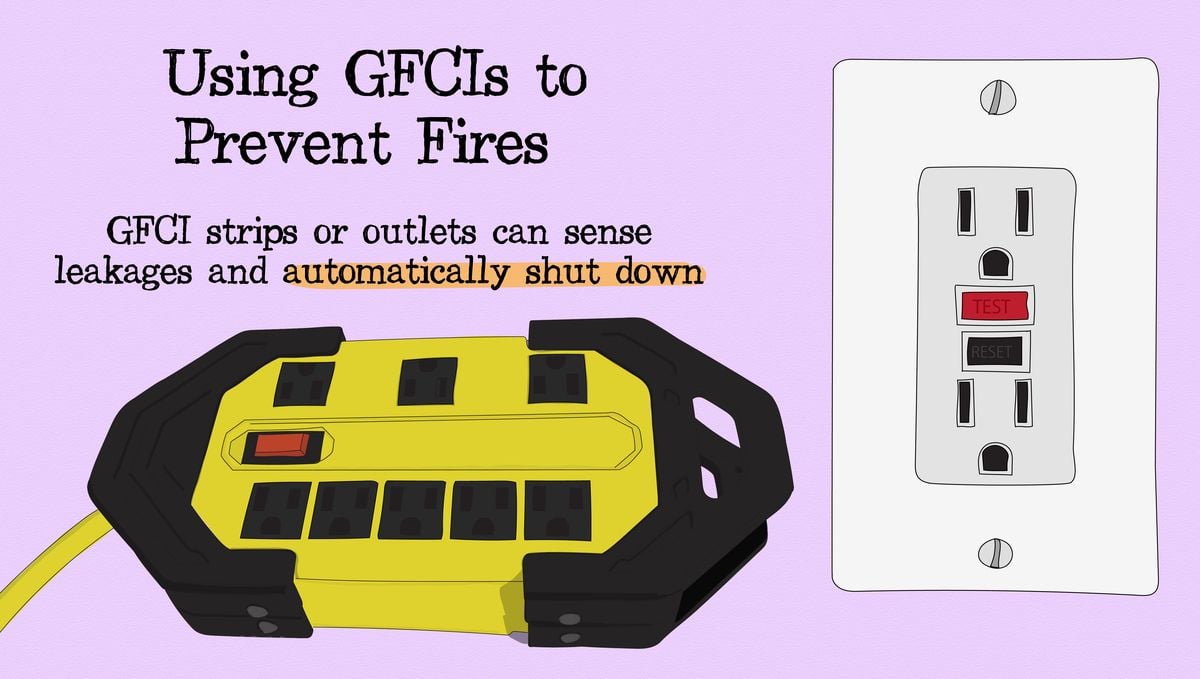
Just remember that if you’re planning on plugging all your equipment on the same GFCI, go for 15A or more because a low-amperage GFCI cannot handle all the equipment.
Smoke Detectors
Smoke detectors are common in most households and super important because they can detect smoke before the fire gets out of control, allowing you to take necessary action early. Now, don’t think smoke detectors are expensive, depending on where you live you may find portable smoke detectors starting at $20.
Get a dual-sensor smoke detector if possible, this way you’ll be able to detect fires faster.
Installing a smoke detector is a great idea because there’s nothing in a grow tent that will make go off, this means that as soon as you hear the smoke detector’s alarm you can rush into your grow room because there’s definitely something wrong and, due to detecting the smoke early, you may be able to put out the fire without much effort.
Additional Tips
- Make sure electronics are away from water. When watering, make sure water doesn’t come near the electronics and make sure your water reservoir is as far as possible from electronics and be extra careful when watering, especially if you’re growing hydroponically.
- If possible, keep electronics off the ground. When possible, try to keep electronics off the ground, this reduces the chances of a short circuit if you spill water accidentally.
- Keep your grow room clean and organized! Things like leaves and cardboard can catch on fire really fast so keep things in place and keep your grow room tidy.
2. Stopping Fires In Your Grow Room
Unfortunately, there’s no way to completely prevent fires because accidents happen no matter what, this is why we recommend always being prepared for the worst, even if it never happens. So here are a couple of gadgets that may save you from losing your harvest, or worse.
Extinguisher Balls
For more serious scenarios, extinguisher balls are the way to go. Unlike smoke detectors that are designed to prevent a fire, these are designed to stop fires in progress and are fairly cheap, starting at around $25. Extinguisher balls work by sensing high heat and when they do, they burst open, releasing a fire-retardant powder, so on top of putting out the fire, it cannot start again. This kind of product is really easy to use because you can either set it in your grow tent (either on top of the ground), near the power outlets or just have it around in case it’s needed. Have in mind that extinguisher balls use a dry chemical that it’s smelly and can hurt electronics apart from being hard to clean up so make sure to keep it in a safe place so it doesn’t go off accidentally.
Aerosol Extinguishers
Aerosol extinguishers are basically tiny fire extinguishers. These products are usually the size of an air freshener can and give you around 30 seconds of spray, meaning that they work but only for smaller fires because they can cover a relatively small area so make sure you also have a regular handheld fire extinguisher is your grow room is relatively big.
Handheld Extinguishers
Handheld extinguishers are the real deal and are what most people think when talking about fire prevention or stopping a fire. There are several types of fire extinguishers and all work great but some of them may leave a big mess.
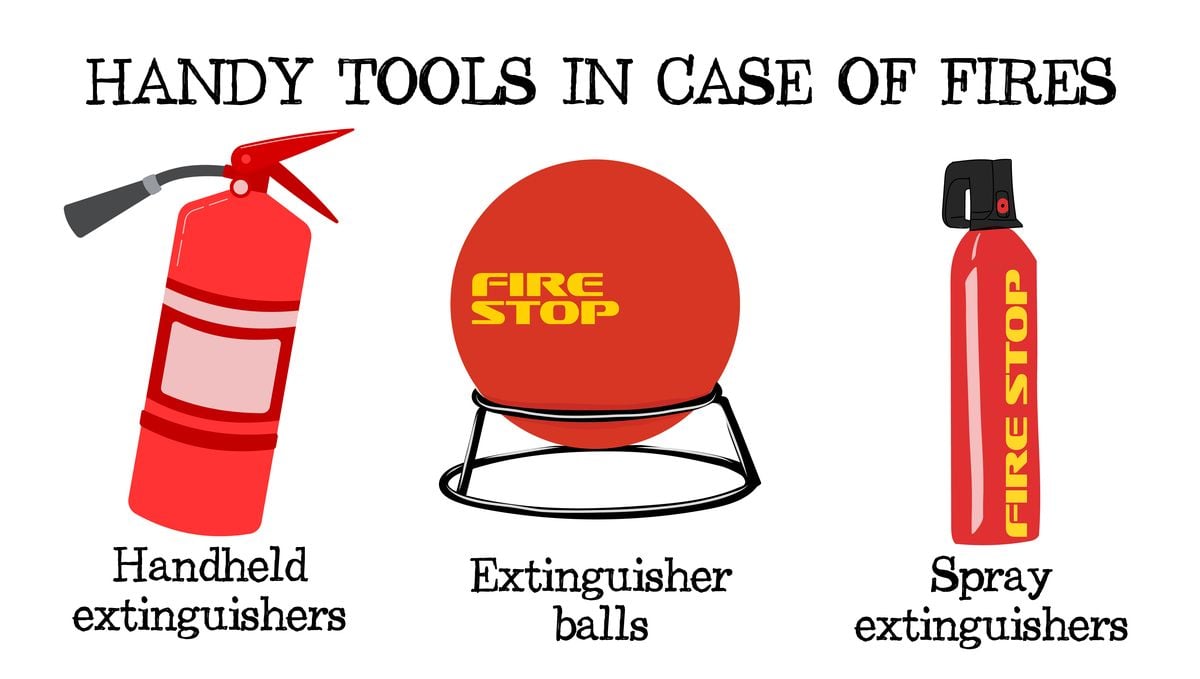
For example, dry chemical extinguishers have great fire-stopping capabilities but will leave your grow room smelling bad, a huge mess, and ruin your growing equipment, which is definitely better than burning down your house but still not ideal. This is why you should get fire extinguishers that don’t leave any chemical residue while still putting out the fire effectively, the only downside being that this type of extinguishers are super expensive, so it’s a matter of evaluating if you’ll really need them.
3. What To Do During A Fire
If by any chance you happen to find yourself in a fire, it’s essential you keep calm. If you get nervous you won’t be able to make the right decisions so once you calm down, try to identify where the smoke is coming from and evaluate if the fire is small enough for you to put it down. If it’s a small fire, try to shut down the power and put the fire out with a fire extinguisher immediately. It’s super important to shut the power down because if the fire was caused by a short circuit, then it could get worse. Remember, never use water to put down the fire unless you know it’s safe to do so!
If the fire is too big for you to deal with it, you should still keep calm but act fast. As soon as you realize the fire is too big, cover your nose and mouth to avoid inhaling smoke and go alert your family members. Grab everyone, make sure everyone exits your house safely and call the fire department as soon as possible to avoid further damage.
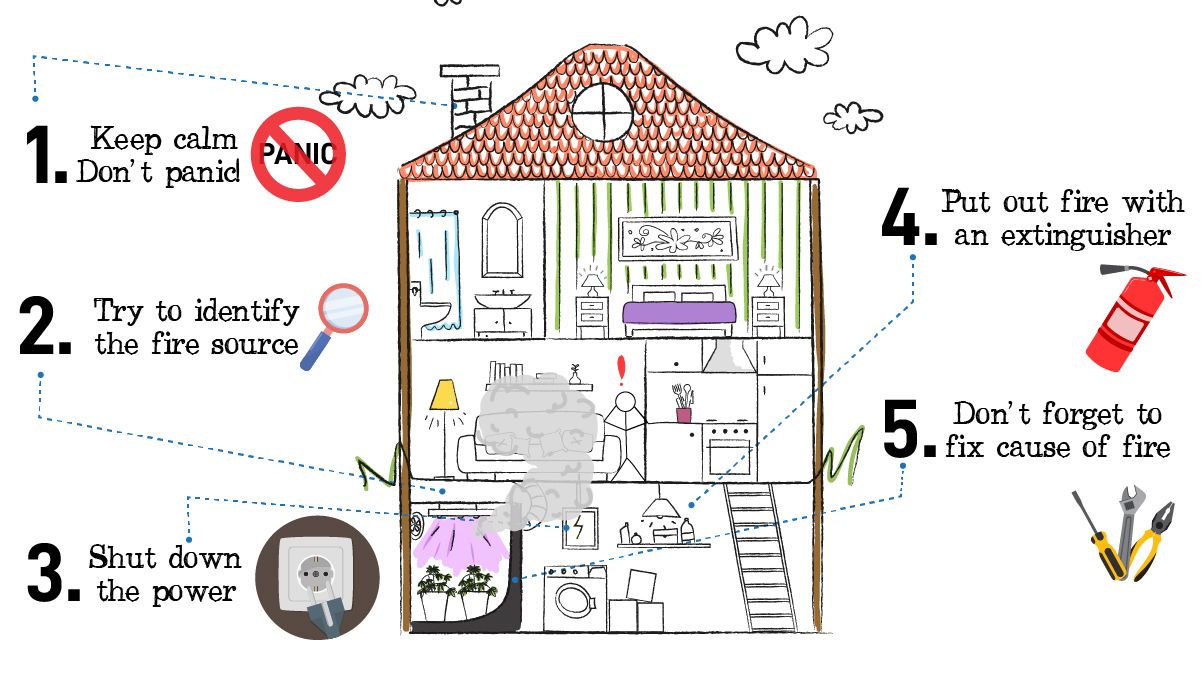
Now, if you live in an apartment building things are a bit more complicated because there are a lot of families living there, so the first thing you should do is sound the fire alarm or try to alert everyone that’s there’s a fire going on. After alerting everyone, it’s time to exit the building; Just to be safe, don’t use the elevator, use the stairs instead and once you’re outside, make sure everyone exits safely. And obviously, call the fire department or police as soon as you exit the building.
4. Top Tips to Keep Your Grow Room Safe
Now, preventing fires is not the only thing you need to take into consideration to keep your grow room safe, so here are a couple of tips you should take into consideration to prevent accidents in your grow room.
Keep Wires Tidy
Tripping and falling are one of the easiest ways to cause accidents. Tripping and falling on your plants will not only hurt you and damage your plants but could potentially cause fires so make sure your tent is organized and use duct tape or cable ties, for example, to keep every wire fixed to the floor or walls. Keep in mind that this is extremely important, especially when growing in hydroponics as an accident like this could cause the water reservoir to spill all the water and cause a short circuit.
Check for Damaged Equipment Regularly
All growing equipment will eventually wear down so make sure to clean and check your growing equipment regularly. Regular maintenance will ensure your system is running perfectly and will also extend the lifetime of the equipment.
Use the Right Equipment
Sometimes you may not have hanging hooks or chains, and you end up using rope or string. Yeah, this works but it also increases the chances of lights falling down and breaking. So avoid improvising and make sure to not only use the right equipment but also make sure the equipment is in good shape. Check your hanging hooks or chains regularly just to make they’re working as they should. Avoid improvising because it will probably cause issues over time. Another example is when growing hydroponically. Yes, regular timers are cheaper but you should use heavy-duty timers to keep your lights and other equipment working as regular timers cannot handle the high electrical load the equipment needs and can end up causing fires or equipment failing.
Keep Equipment and water separated
For those of you who have water reservoirs in the grow area, it’s recommended to have all the electrical equipment above waist height and water equipment below waist height to decrease the chances of them coming in contact. This is highly recommended because in the case of a water spill you won't have to rush and clean everything fast as you know the electrical equipment is safe. Water spills can not only cause fires but can cause you to slip and even attract mold or bugs, so keep everything clean, and safe. Remember, a little goes a long way!
5. In Conclusion
All of these may seem too much for the average home grower but there’s always the possibility something bad happens so make sure you do everything you can to avoid accidents. Obviously, the chance of having a fire in your grow room is super low but you know the saying, it’s better to be safe than sorry.
If you have any more tips and tricks to prevent fire-related accidents, feel free to help fellow growers by leaving a comment in the comment section below!







Comments